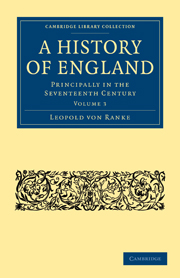Book contents
- Frontmatter
- Contents
- BOOK XI THE COMMONWEALTH IN ENGLAND, 1649—1653
- CHAP. I Republican ideas and institutions in England. The Levellers
- CHAP. II Rinuccini and Cromwell in Ireland
- CHAP. III Charles II and Cromwell in Scotland
- CHAP. IV Growth of the power of the Commonwealth by land and sea
- CHAP. V Dissolution of the Long Parliament
- CHAP. VI The Little Parliament
- BOOK XII THE PROTECTORATE OF OLIVER CROMWELL, 1653–1658
- BOOK XIII FALL OF THE PROTECTORATE AND THE COMMONWEALTH. RESTORATION OF THE MONARCHY, 1658—1660
- BOOK XIV THE FIRST FIVE YEARS UNDER CHARLES II. THE RESTORATION OF THE ANGLICAN CHURCH
- BOOK XV THE DUTCH WARS OF CHARLES II. ESTABLISHMENT OF THE PROTESTANT AND PARLIAMENTARY CHARACTER OF THE CONSTITUTION 1664—1674
CHAP. II - Rinuccini and Cromwell in Ireland
Published online by Cambridge University Press: 07 June 2011
- Frontmatter
- Contents
- BOOK XI THE COMMONWEALTH IN ENGLAND, 1649—1653
- CHAP. I Republican ideas and institutions in England. The Levellers
- CHAP. II Rinuccini and Cromwell in Ireland
- CHAP. III Charles II and Cromwell in Scotland
- CHAP. IV Growth of the power of the Commonwealth by land and sea
- CHAP. V Dissolution of the Long Parliament
- CHAP. VI The Little Parliament
- BOOK XII THE PROTECTORATE OF OLIVER CROMWELL, 1653–1658
- BOOK XIII FALL OF THE PROTECTORATE AND THE COMMONWEALTH. RESTORATION OF THE MONARCHY, 1658—1660
- BOOK XIV THE FIRST FIVE YEARS UNDER CHARLES II. THE RESTORATION OF THE ANGLICAN CHURCH
- BOOK XV THE DUTCH WARS OF CHARLES II. ESTABLISHMENT OF THE PROTESTANT AND PARLIAMENTARY CHARACTER OF THE CONSTITUTION 1664—1674
Summary
We must first describe the alterations of fortune in Ireland, and their connexion with those in England.
Among the Catholics, no less than among the Protestants of that country, there were two distinct parties, one of which, consisting of the original English colonists adhered to the institutions introduced under the kings of England, even those of the schismatic Henry VIII; while the other, which included the native Irish, desired to restore the absolute supremacy of Catholicism in the island, and would even have lent its aid towards a separation from England.
In order to win over the latter Charles I had allowed offers to be made to them through Glamorgan, which he dared not own to in England. They did not however give satisfaction even in Ireland, either in form or in substance: it was noticed as an omission that neither the restoration of the monastic estates confiscated by Henry VIII, nor of the bishoprics which had passed into the hands of the Protestants, was distinctly promised. Fault was found with Glamorgan's powers, because they were issued under the lesser seal only, and the King consequently remained free to do what he liked.
Before this time the Lord Lieutenant of Ireland, James Butler Earl of Ormond, had already negotiated a treaty, in which he refused to agree to concessions so extensive as those granted by Glamorgan. After the latter's attempted compromise had miscarried, through becoming publicly known, Ormond virtually concluded his in the summer of 1646.
- Type
- Chapter
- Information
- A History of EnglandPrincipally in the Seventeenth Century, pp. 22 - 36Publisher: Cambridge University PressPrint publication year: 2010First published in: 1875

